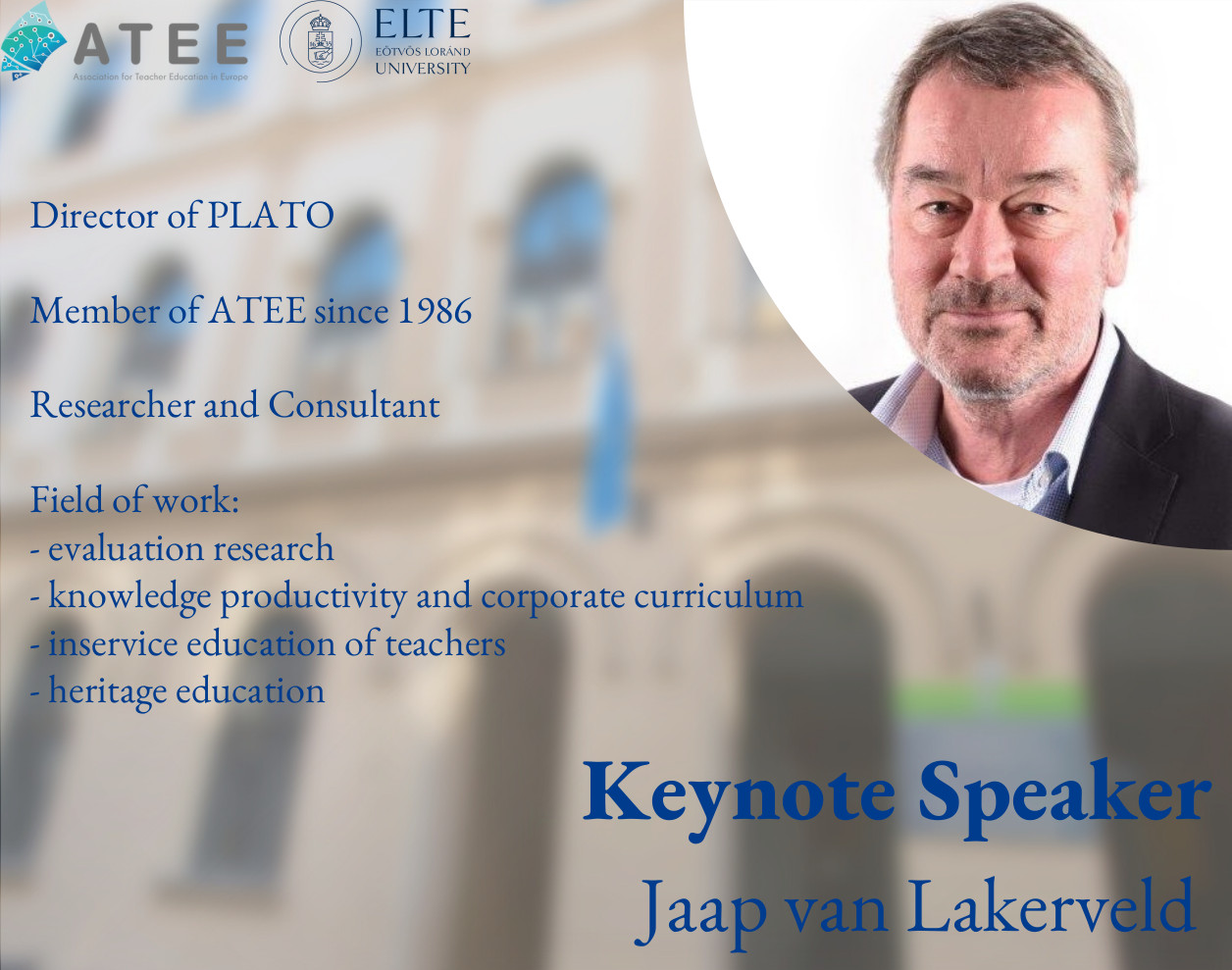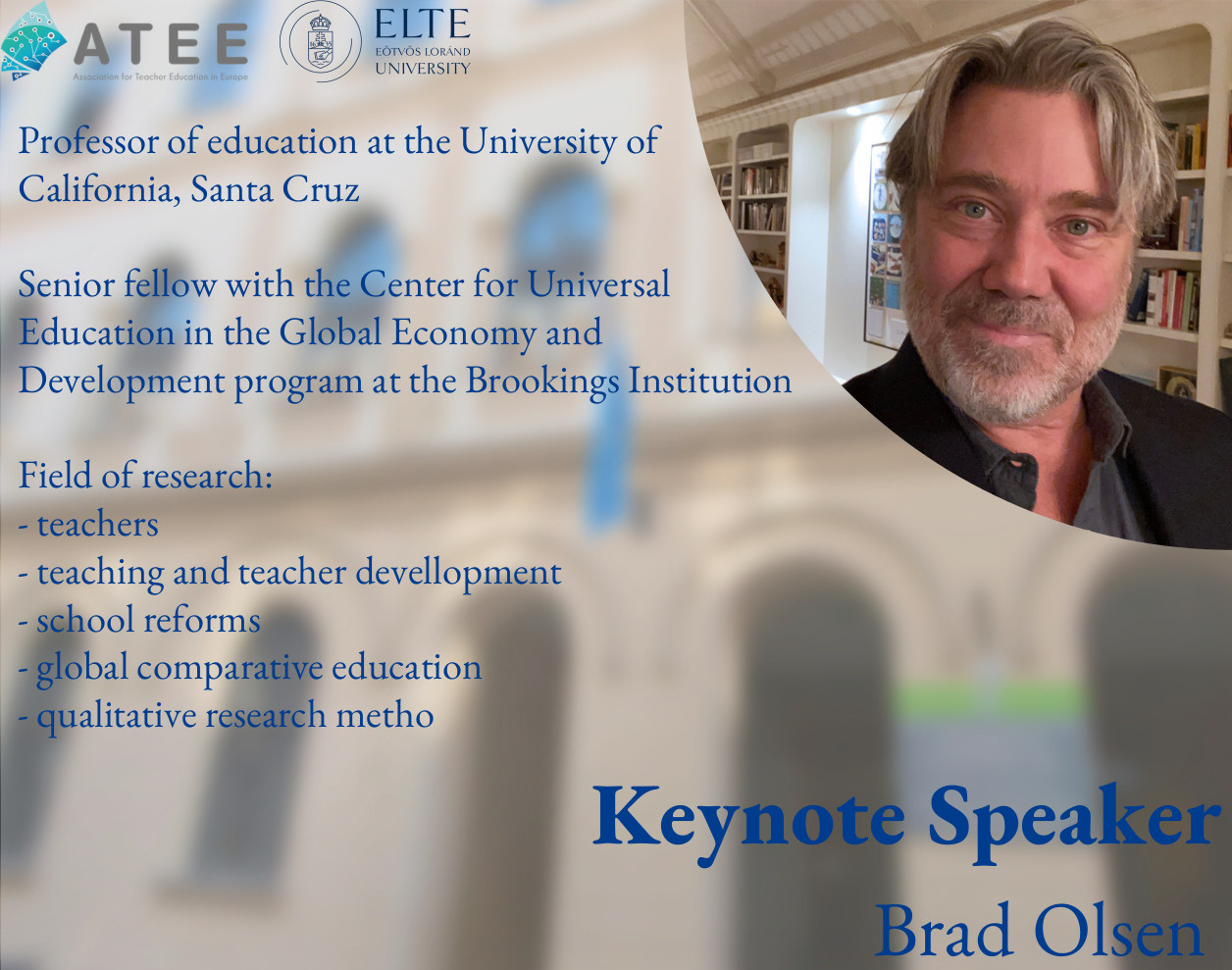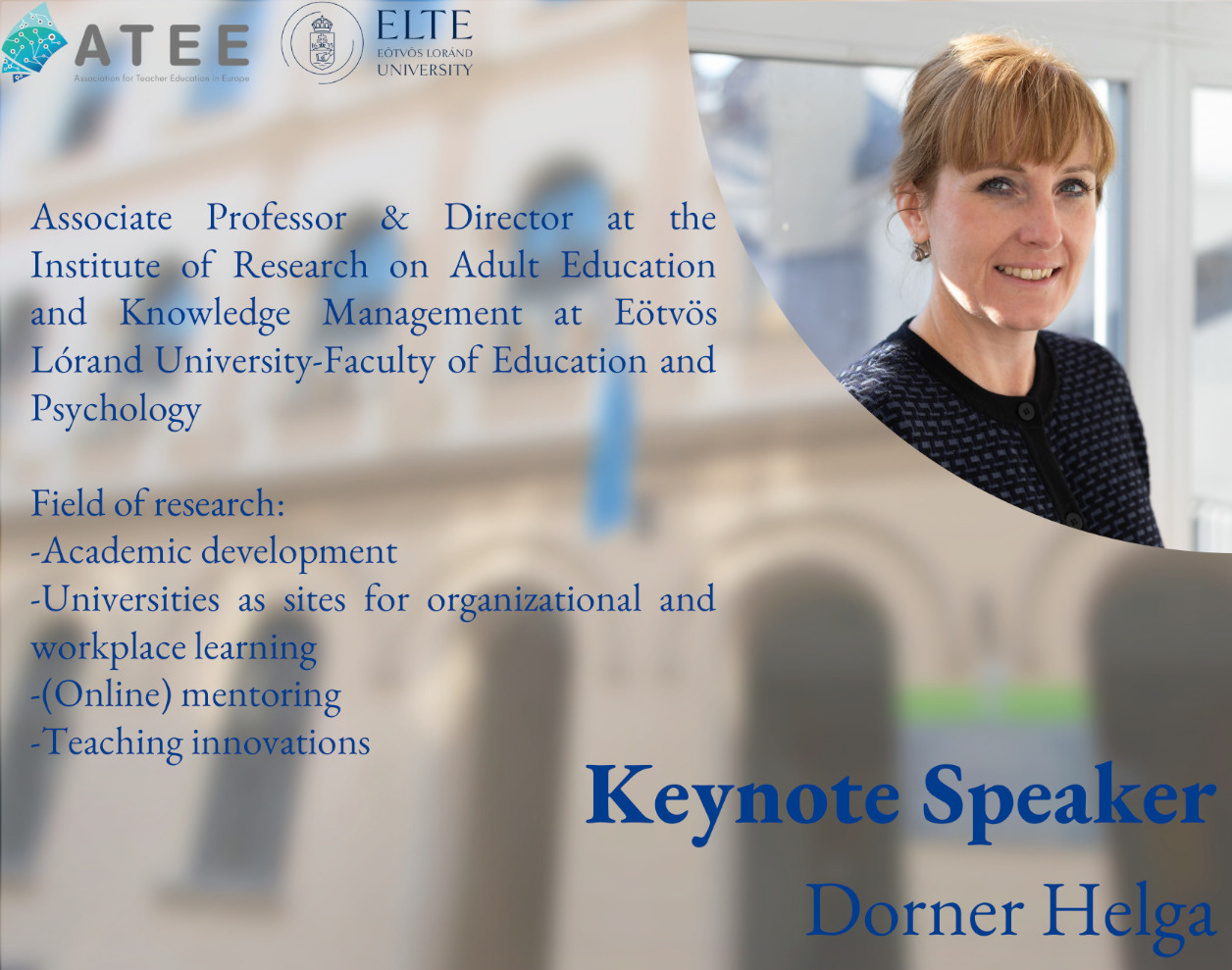Keynote Speakers
Keynote Speakers

Jaap van Lakerveld
Is the director of PLATO, and a member of ATEE since 1986, an independent research and development centre established by the University of Leiden in the Netherlands. He is a researcher, and consultant in matters of (professional) learning and development in education and other organisations. His expertise include (1) evaluation research, (2) knowledge productivity and corporate curriculum , organisational learning and (his PhD thesis was in this area) and 3. In-service education of teachers. He takes part in several projects on heritage education, heritage interpretation and professional development of teachers and people working in the heritage sector. Throughout his career he led several European projects, or was involved as a partner. As a member of the RDC on Inservice learning and the development of practice, he took part for over thirty years in a series of consecutive projects on in service learning of teachers, teacher educators, in-service teacher educators, and facilitators of professional and organisational learning, in and beyond schools.
In recent years he became more and more involved in professional development in the field of crisis and disaster management, a field in which he led two state of the art projects, and International evaluation studies.
Recent publications:
-
- Lakerveld, J. A.van, Buiskool, B. J., Hospers, G., Klein Kranenburg, L., & Matthys, J. (2023). Indicatoren van agressie en geweld.
- Lakerveld, J. A van., & Lindeboom, G. J. (2022). Evaluatie van de inzet en het gebruik van de korte wapenstok door buitengewone opsporingsambtenaren.
- Thomson, S., Cornelius, S., Kopp, E., & van Lakerveld, J. (2022). Boundary crossing in Teacher Education. Pedagógusképzés.
- Buiskool, B-J., van Lakerveld, J., Mertens, P., & Unfried, M. (2021). The effects of national coronavirus crisis management on cross-border crisis management in the Euregio Meuse-Rhine (follow-up study). https://itemcrossborderportal.maastrichtuniversity.nl/link/id/ZVS4paZ4yPJEaAK2
- Lakerveld, J.van, Scholze, T, Tilkin, G. (2019) Competence Oriented Learning and Validation Towards professionalisation and quality, Because learning happens everywhere.
https://reveal-eu.org/wp-content/uploads/2019/12/IO3_REVEAL_Learning_System.pdf - Lakerveld, Jaap van (2018), Heritage and learning EPALE, https://ec.europa.eu/epale/nl/blog/heritage-and-learning
- Lakerveld, Jaap van, Paridon Yolinde van, Gussen, Ingrid(2018) The function of the police: various visions.
- Lakerveld , J.A., van, Vroonhof, P., Broek, S., Stoutjesdijk, F.D. & Loo, S. van (2017). Skills, Training and Knowledge Transfer: Traditional and emerging Heritage Professions.
- Broek, Simon, Lindeboom, Gert Jan, Lakerveld, Jaap van, Evaluation of the International Task Force on Teachers 2014-2016, Ockham IPS/Unesco 2016.
Keynote Speech
Teachers on the move
Jaap van Lakerveld
Abstract
In this presentation an overview will be given of the various ways in which teachers are on the move.
Moving in and out of the profession
The keynote will include facts and reflections on how teachers move in and out the teaching profession; how others, than teachers enter the profession, how people join the teaching profession in various stages of their careers.
Moving geographically
Geo-political, economical and other causes urge people to move to places to search for a safe and viable future. This applies to student and teachers. People are on the move and so will be their educators
Moving into new modes of educating
An other way in which the teaching profession moves is away from traditional teaching towards constructive and interactive learning and knowledge development arrangements in which teachers and learners, as well as parents and other individuals and organizations contribute.
Invading into other disciplines and lowing others to do the reverse
Furthermore the presentation touches upon how the profession itself moves in various directions. It moves into technology and digital development. Electronic learning environments, tools and equipment make the profession move. The outside world invades into schools and vice versa.
Moving towards interprofessional development and learning
Teachers increasingly will be surrounded by their own professional electronic learning environments and become their own, and each others co-coaches or learning facilitators.
An attempt will be made to sketch perspectives, and strategies for the future.

Brad Olsen
Is a senior fellow with the Center for Universal Education in the Global Economy and Development program at the Brookings Institution. Prior to this, Olsen was a professor of education at the University of California, Santa Cruz. His research focuses on teachers, teaching, and teacher development; school reform; global comparative education; and qualitative research methods. At Brookings, Olsen’s work centers on research and policy around the scaling of educational innovations for systemic improvement in low- and middle-income countries around the world. Olsen received his doctorate in education from the University of California, Berkeley, in 2002. He earned his bachelor’s in philosophy and English from Bowdoin College in 1989, and his master’s in education from the Harvard Graduate School of Education in 1993.
Recent Publications:
-
- Olsen, B. et al (2022). Deepening Education Impact: Emerging Lessons from 14 Teams Scaling Innovations in Low- and Middle-Income Countries. Brookings research report. https://www.brookings.edu/research/deepening-education-impact-emerging-lessons-from-14-teams-scaling-innovations-in-low-and-middle-income-countries/
- Olsen, B. et al (2022). How do government decision makers adopt educations for scale? Brookings research report. https://www.brookings.edu/research/how-do-government-decisionmakers-adopt-education-innovations-for-scale/
- Olsen, B., Buchanan, R., Hewko, C. (2022). Recent Trends in Teacher Identity Research and Pedagogy. In The Palgrave Handbook of Teacher Education Research. London: Palgrave Macmillan.
Keynote Speech
Teaching quality and teacher development: Moving back and forth between local needs and global trends
Brad Olsen, The Brookings Institution, Washington DC, USA
Teacher quality is always contested, context-dependent, and tied to the values and politics of a location. Furthermore, good teaching will always include both the personal and professional. It is one of those professions, like the ministry or psychotherapy, that necessarily invokes the ‘personness’ of the specialist while also relying on the professional expertise employed. And, finally, because teacher improvement efforts can be a concrete mechanism for social change, teacher quality is also a policy site of power. Considering all these complexities, Dr. Olsen’s address will (1) unpack the concept of teaching quality and illuminate its meaning in a few different national locations, (2) investigate tensions between local needs and global trends for teacher development, and (3) offer a blueprint for how to think about teacher professional development as a lever for education systems change in whole locations.

Helga Dorner
Helga Dorner is Associate Professor and Director at the Institute of Research on Adult Education and Knowledge Management at the Faculty of Education and Psychology of Eötvös Loránd University (ELTE), Hungary. Before joining ELTE, she was a Senior Lecturer and Director of the Center for Teaching and Learning at the Central European University, Hungary. As the lead faculty member of the Program for Excellence in Teaching in Higher Education, she taught courses in the field of teaching and learning in higher education and socialization of academics. She is also a Fellow of the Higher Education Academy, UK, coordinator of the Higher Education Special Interest Group (SIG4) of the European Association for Research on Learning and Instruction (EARLI), and Board Member of EDEN Digital Learning Europe.
She is an enthusiast for teaching and mentoring in higher education, and enjoys facilitating discussion-based classes in the field of higher and adult education, organizational learning, knowledge and change management. As a mentor and academic developer, she works with novice teachers and researchers.
Recent Publications:
-
- Dorner, H. & Kumar, S. (2022). Academic development for doctoral students: Exploring the relevance of teaching-research integration, discipline-sensitivity and collaboration. International Journal of Academic Development. https://doi.org/10.1080/1360144X.2022.2059486
- Dorner, H. & Belic, J. (2021). From an Individual to an Institution: Observations about the Evolutionary Nature of Conversations. International Journal of Academic Development, 26(3), 210-223. https://doi.org/10.1080/1360144X.2021.1947295
- Dorner, H., Misic, G., & Rymarenko, M. (2021). Online mentoring fo academic practice: strategies, implications, and innovations. Ann. N.Y. Acad. Sci. 1483, 98-11. https://doi.org/10.1111/nyas.14301
- Dorner, H. & Mårtensson, K. (2021). Catalysing pedagogical change in the university ecosystem: Exploring ‘big ideas’ that drive faculty development. Hungarian Educational Research Journal (11)3, 225-229. https://doi.org/10.1556/063.2021.00089
Keynote Speech
“Moving into teaching”: Mentoring as a balancing act to support novice teachers entering the field
This keynote will explore the theme of "Teacher Education on the Move" by revisiting the concept of mentoring as a delicate balancing act that encompasses the careful navigation of dynamics when newcomers enter communities of practice. In doing so, we will examine the role of novice teachers and their mentors as adult learners who may also act as change agents in their organizations. Collaboration will be highlighted as a powerful tool for creating synergies and promoting innovation. Furthermore, we will reflect on the use of online environments to provide support for mediating among mentees, mentors, and their communities. Ultimately, we will argue that by embracing the concepts of adult learning and collaboration, and leveraging online environments, we can create supportive and dynamic teacher communities that foster personal and professional growth.
Important Dates
Call for papers: 2nd January 2023 Abstract Submission Deadline: 15th March 2023
Abstracts submitted will be evaluated until the 15th of April 2023
Notification of Acceptance/Rejection: 25th April 2023
Registration Opening: 10th January, 2023
Early Bird Deadline: 15th June 2023
Registration Closing: 28th July 2023
Registration CLOSED
Conference Dates: 28-30th August 2023
